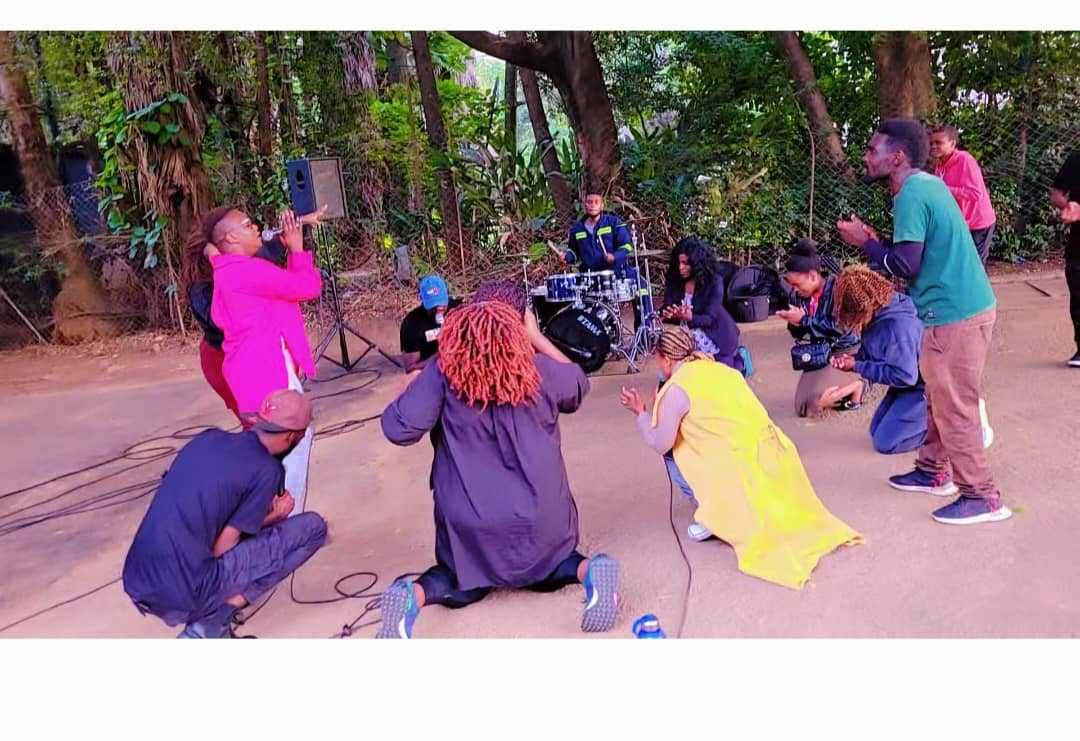
Oscar J Jeke- Zim Now Reporter
Every Tuesday at 4 p.m., something extraordinary unfolds in the heart of Harare Gardens. As the city hums with the chaos of daily life, a stillness takes hold in one corner of the park—a stillness broken not by noise, but by worship.
Voices rise in song, not for an audience, but for God. This is True Worship, a gathering that defies traditional structure and speaks to the soul of anyone who has longed for unfiltered, uninterrupted time in God’s presence.
True Worship is not a church, nor a choir, and certainly not a performance group. It is a movement of worshippers drawn together by the Holy Spirit, guided by a divine mandate to worship God in spirit and in truth. There is no human leader. Instead, the group believes it is led solely by God, who assigns roles and responsibilities to individuals as He sees fit.
The group began as a vision given to a woman years ago: to unite worshippers from different denominations—not for fame, not for profit, but to glorify God in sincerity. That vision has since taken form as True Worship, a place where the only requirement for participation is a heart fully surrendered to God.
“There’s something different about this space,” says Virginia Five, her voice steady, her eyes bright. “I didn’t come here because I was invited. I was just passing through the Gardens when I heard people singing. I felt drawn. The moment I stepped closer and heard them worshipping with such depth, I knew this was what I had been praying for—a place to worship freely.”
Since joining in September 2024, Virginia has not missed a single Tuesday. “This group gave me back my confidence. I came here broken. My spirit was crushed. But through worship, I found healing. No one here is looking to be seen or praised. We’re just here to be with God.”
One of the group’s most defining characteristics is its rejection of payment for worship. “God told us clearly,” a member explains, “If you charge for what I’ve called you to do, I won’t be part of it. Worship is not a service to sell—it’s an offering to give.”
That principle has kept the group grounded and authentic, drawing people like Tinotenda Matanhire, who thought he was attending a casual jam session. “A friend told me about this worship gathering,” he recalls. “I came once, then again, and eventually I couldn’t stop. It became my home.”
Related Stories
For Tinotenda, the group became more than just a spiritual outlet—it became a lifeline. “I’ve walked into the Gardens completely weighed down by life and left renewed. I’ve seen people fall to their knees and give their lives to Christ. I’ve seen tears, breakthroughs, healing. It’s impossible to explain unless you’ve experienced it yourself.”
Jefta Chimvuu, known in gospel circles as Sir Jeff, says True Worship redefined his understanding of what it means to serve in ministry. “Worship isn’t what you do on stage,” he says. “It’s how you live at home, at work, in your thoughts, and in your silence. True Worship taught me that it’s not about performance. It’s about obedience. It’s about lifestyle.”
Jefta, who travels from Domboshava for the weekly sessions, describes them as spiritually transformative. “The Holy Spirit leads everything here. There’s no rehearsed agenda. It’s all about being available and ready to be used by God. My prayer life has grown. My understanding of scripture has deepened. And my faith has become stronger.”
Indeed, the group’s culture is deeply rooted in daily devotion—consistent prayer, immersion in the Word, and a life of praise. Worship is not confined to Tuesdays; it is lived every day. “We are vessels,” a worshipper says. “God pours into us during the week, so on Tuesdays, we pour out.”
The stories emerging from this simple yet profound gathering are remarkable. One passerby reportedly stood frozen for almost an hour, overwhelmed by the atmosphere. Later, she confessed that she had come to the Gardens that day intending to end her life—but what she encountered during worship changed everything. “God met me here,” she said. “He saved me before I could destroy myself.”
For those within the movement, stories like that are both humbling and affirming. “We don’t advertise. We don’t recruit,” one member reflects. “But people find us, just like God found us.”
True Worship dreams of expanding—not for visibility, but for impact. “From Harare to the ends of the earth,” one founder said. “We want to gather every worshipper who longs for intimacy with God. Every voice, every instrument, every heart that lives to glorify the King.”
As twilight falls each Tuesday and the last song fades into the Harare night, what remains is not just an echo of music, but a trace of heaven on earth. People leave lighter, stronger, filled—not because they were entertained, but because they were transformed.
True Worship isn’t just a gathering. It’s a return. A return to the heart of worship, where God—not man—is the only focus.



















Leave Comments